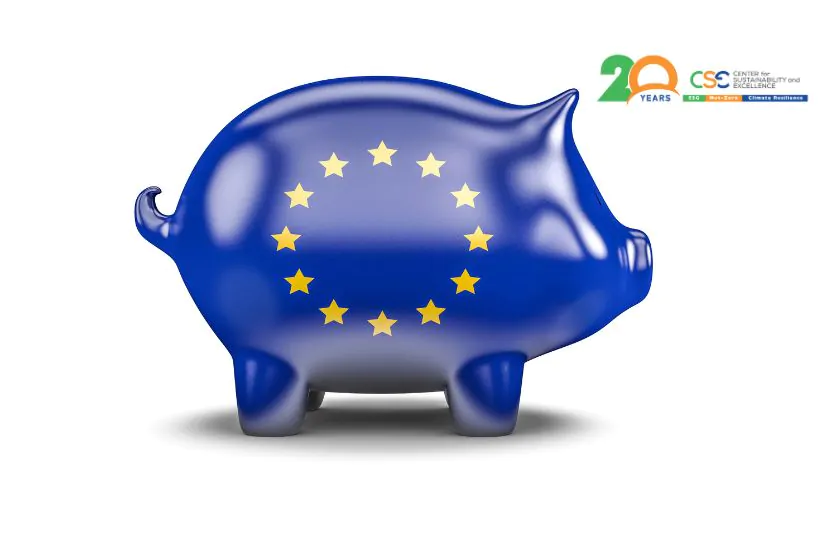Europe stands at a crossroads. The next Multiannual Financial Framework (MFF) 2028–2034, the EU’s long-term budget, will determine how Europe invests in climate action, innovation, and industrial competitiveness over the next decade.
With global competition intensifying and climate impacts worsening, the MFF must do more than balance numbers, it must set the strategic direction for Europe’s green industrial transformation.
Yet, member states remain divided. The “frugal” countries, like Sweden, Austria, and the Netherlands, demand fiscal restraint, while the “friends of cohesion” call for expanded funding for agriculture and regional growth. Caught between the lines Europe’s climate agenda, the defining test of whether the continent can sustain its green leadership.
If compromise fails, Europe risks losing both its climate credibility and its competitive edge in the global green economy.
Benefits of a Climate-Focused MFF
A climate-forward EU budget is not just about sustainability — it’s a blueprint for economic resilience, energy independence, and innovation.
- Boosting Industrial Competitiveness
Prioritizing clean industries attracts private investment and secures Europe’s role in global value chains. Initiatives like the Green Deal Industrial Plan are already laying the groundwork. - Reducing Energy Dependence
Investments in renewables, grids, and electrification strengthen energy security and protect the EU from geopolitical shocks — a lesson reinforced by the energy crisis following the war in Ukraine. - Fostering Innovation and Research
Doubling funding for Horizon Europe and aligning it with industrial policy could accelerate clean technology commercialization. - Creating High-Quality Jobs
Climate investments generate skilled employment in construction, energy, digitalization, and manufacturing sectors. - Strengthening Cohesion and Security
Green infrastructure in border and peripheral regions fosters both regional prosperity and strategic stability.
A well-designed MFF can therefore unite environmental, economic, and social goals under one long-term European vision.
Practical Steps to Align the MFF with Climate Goals
- Prioritize the Competitiveness Fund
The proposed €67 billion Competitiveness Fund is the linchpin of Europe’s green transition. It merges 14 programs into one, simplifying access and channeling capital toward clean technologies, industrial decarbonisation, and research.
Member states must defend this fund from budget cuts and ensure transparent, data-driven governance. - Make Climate Mainstream — Not Marginal
The European Commission’s proposal to earmark 35% of total EU spending for climate and environment must be implemented with clear definitions and measurable outcomes, avoiding “greenwashing” through creative accounting. - Secure Predictable Revenue Sources
Revenues from the EU Emissions Trading System (ETS), the Carbon Border Adjustment Mechanism (CBAM), and green taxes should directly support climate investments — ensuring a stable foundation for long-term financing. - Bridge the North–South Divide
Green innovation hubs in advanced economies must coexist with fair support for lagging regions. Allocating part of the Competitiveness Fund by objective criteria can ensure both efficiency and equity.
Common Pitfalls to Avoid
- Fragmented governance: Overlapping financial instruments dilute impact.
- Political short-termism: Cutting climate funds to preserve traditional subsidies undermines long-term competitiveness.
- Weak accountability: Without transparent metrics, climate targets risk becoming symbolic.
Real-World Example: Lessons from NextGenerationEU
The NextGenerationEU recovery fund proved that EU-level financing can deliver rapid green transformation.
According to the European Commission, it has already generated €66 billion in direct benefits for member states through investments in clean transport, building renovation, and renewables.
The next MFF should build on this momentum, making green investment a permanent structural pillar, not a temporary response to crises.
FAQs
What is the EU MFF in simple terms?
The Multiannual Financial Framework (MFF) is the EU’s long-term budget that determines funding priorities, from climate action to agriculture, for seven years.
How does the MFF impact climate action?
It dictates how much funding goes toward clean technologies, renewables, industrial decarbonisation, and climate resilience.
When will the new MFF take effect?
The next MFF covers 2028–2034 and must be agreed by late 2026 or early 2027.
Start Learning Today!
Want to understand how EU policies, ESG frameworks, and sustainability reporting standards (like ESRS and CSRD) are transforming business in Europe?
Enroll in the Certified Sustainability (ESG) Practitioner Program – Advanced Edition (Europe)
This globally recognized program helps professionals master ESG strategy, reporting, and regulatory compliance, with a special focus on European sustainability frameworks and EU Green Deal alignment.
You can also advance your expertise through a Double Certification in Sustainability (ESG) Reporting — ideal for professionals leading corporate sustainability disclosures aligned with ESRS, GRI, and CSRD standards.
Take the next step in your ESG career and help shape Europe’s sustainable future.







